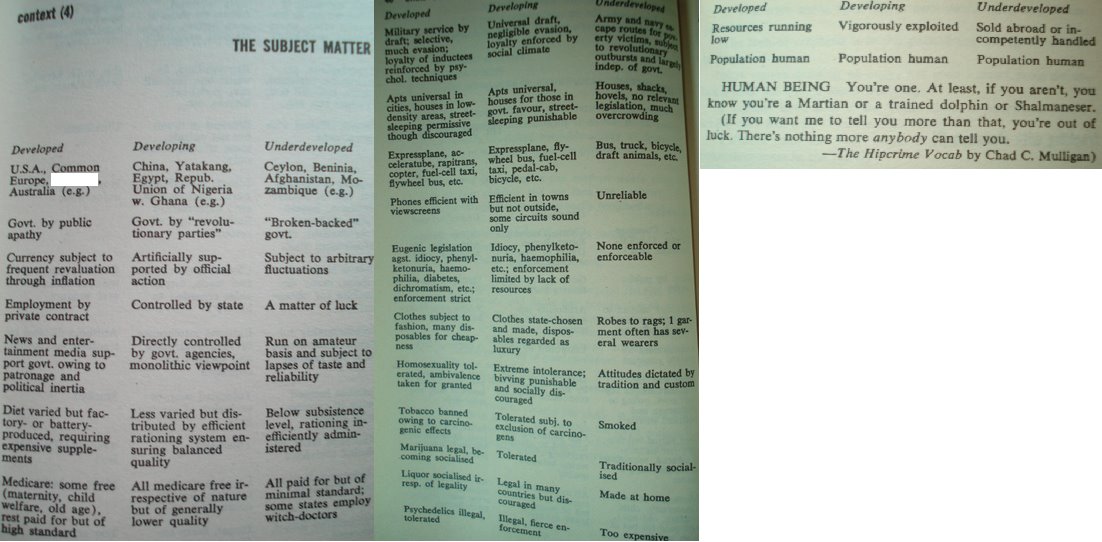I came across John Brunner a few years ago when I read Stand on Zanzibar . I love Brunner because his writing style adheres to some of my core beliefs of what sci-fi writing should be about. Here are three excerpts from The Shockwave Rider (1975) which is based in the early 21st century that illustrate why you should be reading his works.
_ FENCED BUT NOT FOILED _
Inter alia the Handbook of the National Association of Players at the Game of Fencing states:
- The game may be played manually or electronically.
- The field shall consist of 101 parallel equidistant lines coded AA, AB, AC … BA, BB, BC … to EA (omitting the letter I), crossed at 90 ° by 71 parallel equidistant lines 01 to 71.
- The object is to enclose with triangles a greater number of coordinate points than the opponent…
Worldbuilding over Narrative - I am strongly of the belief that in sci-fi the context is more important than the storyline itself. A lot of excellent sci-fi has been created by taking contemporary stories and contextualizing them in imaginary worlds - a good example being The Stars by Destination, a futuristic retelling of The Count of Monte Cristo. The stock approach is to let context be implied from dialogues and monologues (diary entries being the most pedestrian of the lot) and it is pretty hard to build a lot of context quickly without boring the audience.
In Shockwave, Brunner introduces the fictional game of Fencing in a brutally efficient manner by simply including a Fencing Rulebook between chapters, abruptly and with no additional context. Contrast this with how the late Iain Banks labours through each contest in The Player of Games (loved the substance, hated the style)
“I’m a poor player myself; it would be a mismatch. But why did fencing appeal to you rather than, say, Go, or even chess?”
“Chess has been automated,” was the prompt reply. “How long is it since a world champion has done without computer assistance?”
“I see. Yes, I understand nobody has yet written a competent fencing program. Did you try it? You had adequate capacity.”
“Oh, using a program to play chess is work. Games are for fun. I guess I could have spoiled fencing, if I’d spent a year or two on the job. I didn’t want to.”
Technology but also how social values have been influenced by technological change - Brunner cares deeply about social problems of the future and how technology hasn’t done a good job of solving them.
Brunner having spent a few pages writing up the rules of Fencing, avoids the temptation of having a match-up between the protagonist and his interlocutor. Instead they talk about the value in creating an AI to “solve” it which is an important topic few people have addressed. Likewise that Brunner came up with Shockwave’s larger theme (I won’t tell you exactly what it is) 40 years ago gives me goosebumps in light of Apple vs the FBI!
Prescience - Brunner retains healthy realism in all his writing - he doesn’t make up overly fancy tech or aliens and he makes some pretty accurate predictions about the future. I find it fascinating that in Shockwave which is set in the early 21st Century correctly predicts AIs cracking chess and implies Go has been “solved” as well. Timely given how Lee Seedol has been faring vs AlphaGo.
By the time Reverend Lazarus fought his way through the maze of interlinked credit-appraisal computers and nailed the tapeworm that had just been hatched, he could well be ragged and starving.
Neologisms - Brunner does an excellent job of coming up with new words for things that don’t exist yet (almost none of them being portmanteaus - too contrived and easy). The bit above isn’t representative except it just happens to be perhaps the first time someone thought about self-replicating malware and decided this was an appropriate name for it.
I’ll end with this chapter-within-chapter from Stand on Zanzibar (written in 1968) that illustrates all of this again - worldbuilding over narrative, social impact of tech, prescience and neologisms - doesn’t “acceleratube” remind you of something?
